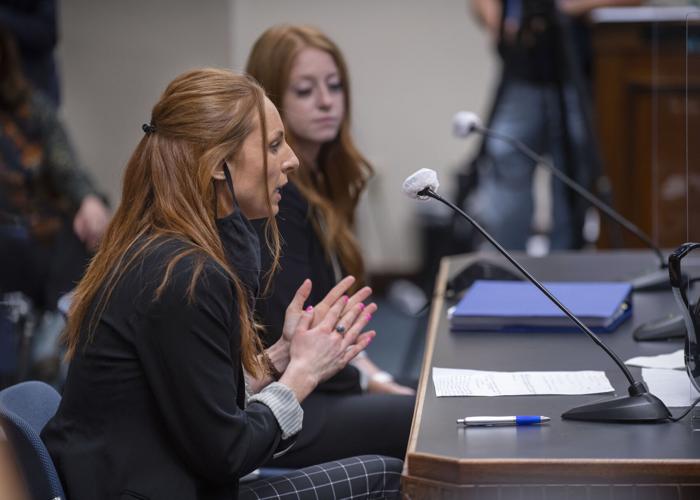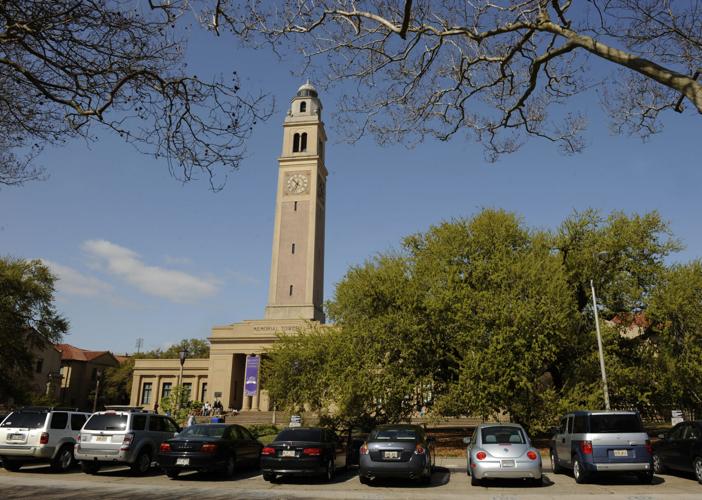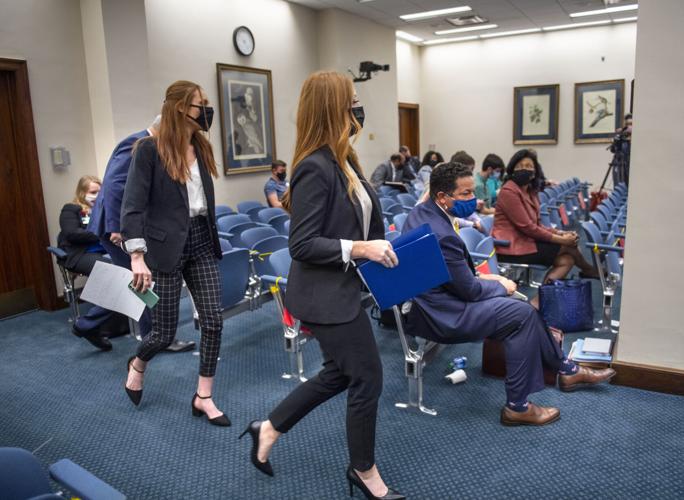Seven women who have come forward in recent months with stories about being sexually assaulted or beaten on LSU’s campus and then failed by administrators after reporting the allegations filed a federal lawsuit against the university Monday.
The suit alleges violations of the federal Title IX law that prohibits institutions from discriminating based on sex, and was filed in the Baton Rouge-based U.S. Middle District of Louisiana. The plaintiffs have become familiar names in Baton Rouge as they’ve testified before the Legislature and protested on LSU’s campus. They include former LSU tennis players Abby Owens, Jade Lewis and Kennan Johnson; former LSU Athletic Department student workers Samantha Brennan and Calise Richardson; soon-to-be-LSU-graduate Elisabeth Andries and a Jane Doe.
Named as defendants are LSU and its Board of Supervisors, Tiger Athletic Foundation, former LSU President F. King Alexander, former LSU Chief Human Resources Officer A.G. Monaco, former LSU Title IX Coordinator Jennie Stewart, LSU’s recent Associate Dean of Students Jonathan Sanders, Assistant Dean of Students Tracy Blanchard and Senior Assistant General Counsel Jim Marchand.
Michael Martin has been in charge of universities across the country, but he says he’s only worked in one state where the governor has called …
Several Athletic Department officials are also named as defendants: former Athletic Director Joe Alleva, Executive Deputy Athletic Director Verge Ausberry, Senior Associate Athletic Director Miriam Segar, Associate Athletic Director Sharon Lewis, tennis coaches Michael and Julia Sell and Assistant Director of Recruiting Keava Soil-Cormier.
The lawsuit alleges that despite federal mandates and LSU’s own policies, LSU “repeatedly engaged in discriminatory, retaliatory, and other unlawful actions” whenever the students tried to report rape, domestic violence and other problems on campus. The lawsuit also leans on the findings in the recent report by the law firm Husch Blackwell that LSU had widespread Title IX failures, and it levels criticisms at a “football centric-culture,” saying women’s sports have not been afforded comparable resources and that male athletes have often not been held accountable for their actions.
Karen Truszkowski, the Michigan attorney who is representing the women said in a news release Monday that while many have focused on the discipline LSU has imposed against key staffers, more attention needs to paid to "the young people who were hurt, damaged, ignored and at times ridiculed."
She referenced a new punishment LSU announced Friday night for Ausberry, banning him from attending football games next season.
An attorney for LSU Senior Associate Athletic Director Miriam Segar sent a letter Tuesday to the Senate Select Committee on Women and Children…
"This speaks volumes about the priorities of LSU’s administration and the Board of Supervisors," Truszkowski said. "The priority is not deterrence and compliance. The priority is football. Period."
Jim Sabourin, LSU's vice president of strategic communications, said Monday that officials had just learned of the lawsuit and hadn't had time to review it yet. He said LSU is "focused on taking actions to ensure that we create a campus that is safe, just and worthy of the trust that has been placed in us."
The women are pursuing a class-action suit, alleging that LSU showed deliberate indifference to sex discrimination, fostered a hostile environment, put students at heightened risk, retaliated against those who reported Title IX violations and denied equal protection and due process to all students. They also allege that LSU committed a civil conspiracy and violated the Racketeer Influenced and Corrupt Organizations Act, or RICO, the federal law often used to take down organized crime syndicates.
Husch Blackwell probed cases involving 10 different LSU football players accused of sexual misconduct in recent years as part of the law firm’…
The lawsuit says the Tiger Athletic Foundation solicited donations to "implement a deficient sexual misconduct education program and reporting scheme within the Athletics Department that was knowingly not able to meet the standards mandated by the NCAA or Title IX."
The women are asking for statutory and punitive damages expected to exceed $5 million, attorney's fees and court costs and a permanent injunction "requiring compliance with Title IX and recurring external audits of LSU’s Title IX compliance."
This is the second federal lawsuit LSU faces amid broad fallout from a scandal that has rocked the state's flagship campus. It's also the second civil lawsuit making racketeering claims. While she’s a defendant in the lawsuit filed Monday, Sharon Lewis is the plaintiff in the other federal lawsuit against the university. More litigation could be coming: an attorney for Segar sent a litigation hold notice last week to Husch Blackwell that says the firm's report “resulted in serious and unwarranted damages” to Segar.
Attorneys representing most of the defendants in the new lawsuit either declined to comment or did not return messages Monday. Monaco said Monday that LSU's human resources department does not handle cases of misconduct among students; instead, HR takes up complaints between employees. He defended his actions in the cases he knew about. Monaco has previously said he reported a sexual harassment allegation involving former LSU football coach Les Miles to his higher-ups.
In its strongest actions to date in the ongoing sexual harassment scandal at LSU, the university terminated Taylor Porter, its law firm for th…
But Monaco also did not defend LSU.
“The reality is, LSU will not get better until the governors and the board do not put athletics ahead of academics, which they have always done, at least in the time I was there," he said.
Title IX lawsuits in Louisiana have a one-year prescription period, meaning they generally need to be filed within one year of the alleged violation. But the misdeeds alleged in the lawsuit filed on Monday go back several years. In cases alleging conspiracy, older acts may be deemed relevant as long as some acts took place within the prescription period.
Owens said that former LSU star running back Derrius Guice raped her in 2016 after buying her tequila shots at a bar one night and driving her home. She spiraled into addiction, went to rehab the next year and began telling people about what happened. Her dad told Julia Sell about the rape during a 2017 tennis tournament, but Sell said she didn't believe him, according to the lawsuit.
As LSU’s flagship campus continues to convulse in anger over how top officials have handled allegations of sexual harassment and dating violen…
Owens never heard from anyone in LSU’s Title IX office, nor did anyone at LSU offer her “any support, resources, accommodations, or interim measures, failing to ensure that Owens could return safely to complete her degree,” the lawsuit says. Owens left LSU and recently graduated from the University of Georgia.
Guice also had an encounter with Brennan in 2016, a few months after Owens said he raped her. He and Brennan met one night at a bar, and she woke up the next morning undressed and unable to remember what happened. She found Guice’s wallet on her couch and they made plans for Guice to retrieve it, the lawsuit says.
But a few weeks later, Brennan learned that a nude photo of her was being shared among football players from the night that she’d been with Guice. She filed an LSU Police report after meeting with Sharon Lewis and Segar. She declined to pursue charges against him, but never heard from anyone in LSU’s Title IX office about the incident.
"The intense depression and lack of self-worth Brennan felt, caused by Guice’s distribution of her nude photograph without her consent, LSU’s lack of response, and the subsequent public support of Guice caused Brennan to decide to drop out of LSU," the lawsuit says.
Attorneys for former LSU head football coach Les Miles held several discussions in 2013 about a settlement agreement with a student who accuse…
Guice was also close friends with Richardson in 2016 and slept at her apartment one night, but attempted to rape her the next morning, according to the lawsuit. When Richardson told him to stop, the lawsuit says he yelled at her and threatened to ruin her life. Richardson attempted to report the incident to Soil-Cormier, who responded by asking “why Richardson would let Guice in her room if she did not want to have sex with him,” the lawsuit says. Soil-Cormier did not return a message left with an Athletic Department spokesman.
Guice, who set records as a running back at LSU, has never been booked in connection with any of the allegations against him during his time at the university. He was arrested last year in Virginia on domestic violence charges and cut from the Washington Football Team.
Richardson, who worked in the LSU football recruiting office, was also raped by an LSU football recruit in 2015, according to the lawsuit. The suit does not name the recruit, but says she did not report the rape based on "the conduct of her supervisors," who often told recruits that Richardson would "show recruits a good time and all that LSU has to offer" in sexually suggestive tones.
“Over the course of Richardson’s job, she began to realize that female recruiters were expected to please the recruits in any way they could, which included having sex with the recruits,” the lawsuit says.
More than a month after LSU released the report by the law firm Husch Blackwell on the university's past failures in handling complaints of se…
Richardson also dated former LSU wide receiver Drake Davis. Davis shoved her to the ground at a bar one night in 2016 and his teammates had to restrain him from further attacking her, the lawsuit says. When Richardson later tried to report what happened to supervisors, they laughed at her, according to the lawsuit. She later lost her job in LSU Athletics.
Jade Lewis was also in an abusive relationship with Davis starting in 2017. She reported her abuse to a team athletic trainer in May 2017, the first time she’d personally told anyone at LSU, according to the lawsuit.
But it does not appear that the trainer reported her disclosure to the police, to Title IX or to anyone, despite having a legal obligation to do so, the lawsuit says. Over the next year, Lewis, her father, her teammates and even Davis himself made various mentions of Davis' violence toward Lewis to Athletic Department officials, but they did little to intervene, the lawsuit says. Davis grew increasingly violent and broke into her apartment one night in June 2018, nearly strangling her to death, and prompting intervention from police.
Davis was arrested in August 2018, and later pleaded guilty to battery of a dating partner and violating a protective order.
Two months after the U.S. Department of Education launched an investigation into how LSU reports and investigates crimes on campus, the same f…
Johnson also played on the LSU tennis team. Sell would frequently tell her that she needed to lose weight, emotionally abuse her and make disparaging comments about her sexual orientation, according to the lawsuit. Though LSU athletes went through Title IX training, they never learned that weight and sexual orientation harassment could be addressed via Title IX, according to the suit.
Johnson also tried to tell Sell that Lewis was being abused, to no avail, the lawsuit says.
“When Johnson told her about the abuse, Defendant Julia Sell ignored the information and told Johnson that if she stopped ‘worrying so much about other people,’ she would be a better tennis player,” the lawsuit says.
Andries began studying at LSU in 2016, and went on a fraternity bus trip that fall, during which another student forcefully groped her, leaving bruises on her chest, the lawsuit says. She tried to brush off the experience and remained friendly with the student involved. But when he visited her apartment the next year, he began to grope her again, until she kicked him out. The second incident prompted her to process the first, and she went to get counseling and other resources.
LSU officials announced Friday that they would provide former LSU student Samantha Brennan with an unredacted version of a police report based…
She began to avoid the student, but they were both engineering majors and she had a panic attack in 2019 when she saw him in a class of hers. She signed up for disability accommodations so that she could avoid sharing a class with him, and went through the Title IX process in hopes of avoiding contact with him. But the process dragged and LSU officials did little to help, the lawsuit says.
“Even though (he) had been found responsible for sexually assaulting Andries, LSU placed the burden on Andries to avoid (him) and failed to provide any protective measures or reasonable accommodation to Andries," the lawsuit says.








